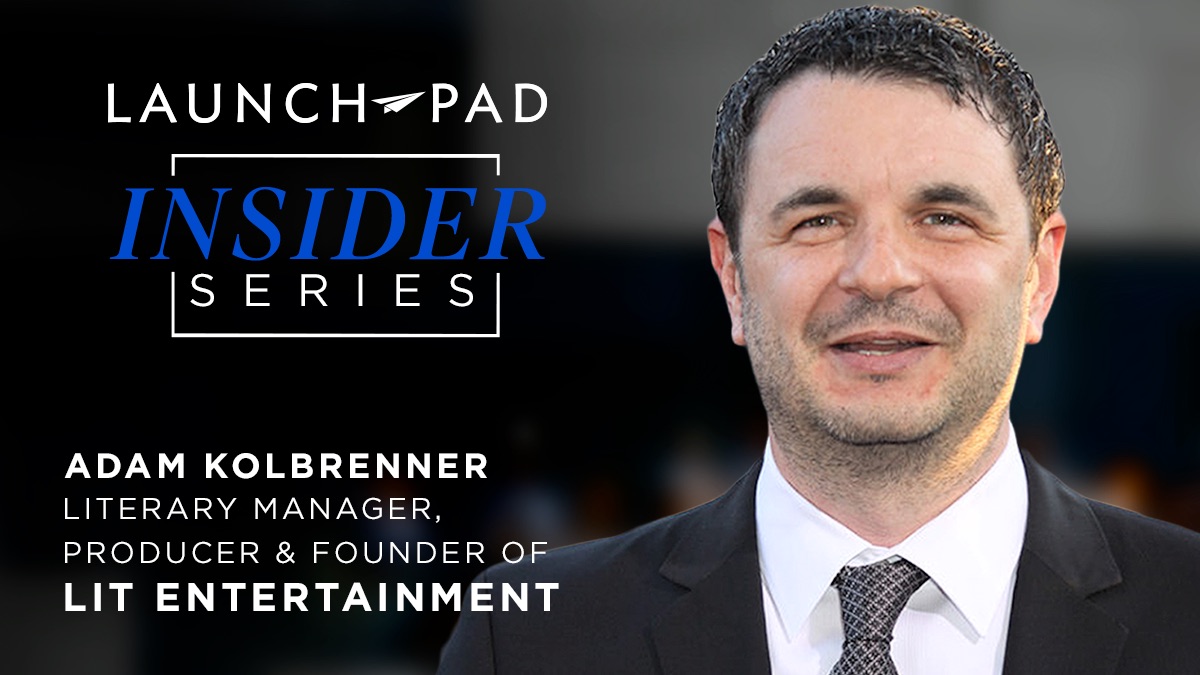
The Launch Pad Insider Series returned last week with a live Q&A video on Facebook with Adam Kolbrenner, leading manager, producer, and founder of Lit Entertainment. In a nearly hour-long conversation with writer and Launch Pad finalist Jess Harris-Distefano, they covered essential information for writers just starting out, as well as seasoned scribes who might need to remember a thing or two.
Here are 10 key tips from that conversation:
FOCUS ON THE WORK
Being a screenwriter is not glamorous, especially for those who are still getting started in their careers. “You have to show a willingness to do the work,” Kolbrenner said.
It takes focus, determination, and repetition. Writers need to wake up every day and generate new material. They should produce new material every year — and substantial new material, at that. Kolbrenner didn’t want to assign a number but suggested a range of 200 to 300 new pages per year.
Managers are looking for hungry writers who are not only willing but want to do the work. That means thinking of screenwriting as a full-time job, not a hobby.
DON’T FORGET TO RESEARCH
“You are baking a certain type of bread,” Kolbrenner said. “You want to make sure that the restaurant that you’re selling the bread to actually puts bread on tables.”
A running theme in the Q&A with Kolbrenner was the importance of research in a writer’s journey. It is essential that a writer be up for the challenge of doing research — and a lot of it. But research is more than simply searching for management companies with open submission policies; it’s as big as looking for the managers who represent the writers you aspire to be, as straightforward as digging into what kinds of projects certain management companies produce, and as small as making sure that you have someone’s name spelled correctly in an email. The crucial thing to remember about research is that it will be painfully obvious if you haven’t done it well, so it’s well worth the investment of your time.
SOMETIMES RISKY MOVES ARE WORTH IT
While stories of crazy Hollywood success may overwhelm the media, they are not the norm. They do, however, have one important thing in common that every writer can learn from: sometimes the risk is worth the potential reward.
Kolbrenner shared an anecdote about a writer who, in an attempt to get his attention, sent a physical query letter. It worked. Something so old-school and personal in the days of digital overload piqued Kolbrenner’s interest. He reached out to the writer to meet him and a creative partnership blossomed. A few years later, Aaron Guzikowski wrote the screenplay for the Oscar-nominated “Prisoners” with Kolbrenner as his manager.
WRITING IS NOT THE WHOLE JOB
Writers must also understand that, unfortunately, writing isn’t the whole job. The pages are important, but they’re only a part of the whole. Being a “writer” means taking meetings, having creative and practical conversations, working with people at all levels of Hollywood, and receiving and implementing feedback on your work.
This is especially important when trying to get a manager. Both Kolbrenner and Harris-Distefano stressed the importance of finding someone with whom you have a kind of friendship. Your manager should be someone you feel comfortable with, and someone who understands you as a writer, your story, and your personal taste.
CULTIVATE YOUR BRAND
Like it or not, part of being a writer is cultivating a brand. Just like a social media influencer or consumer goods company, writers must create a personal brand that defines who they are and what they write.
For those at the beginning of their career, this means sticking to a single path instead of trying to take all the roads at once. As you build a career as a writer, choose a genre that suits your style. Don’t switch drastically — moving from a goofy comedy to a dark thriller will confuse potential managers, agents, and producers who might be interested in your work. If they can’t figure out what you write, they’ll move on.
BE A PIGEON
The next question from most writers is something like, “But won’t I be pigeonholing myself by choosing a single genre?” Kolbrenner’s answer is simple.
“Be a pigeon first.”
Writers who choose a path as they set out on their careers can always write themselves onto another path later. That’s the beauty of being a screenwriter. “As a writer, you control your universe,” Kolbrenner said. That control applies to writers at all points in their careers. So be a pigeon in the beginning — choose a genre to work within, establish a name for yourself, move toward a goal — and then free yourself later by taking a big swing and trying something new.
WHAT MATTERS MOST
It all comes back to the work. Kolbrenner shared a secret during the Q&A — what two things he looks for as a manager.
- What’s your idea?
- Is the script good?
Simple as that. Stick to what matters most: the material. But, Kolbrenner warns, don’t be in a rush to send out material. Writers often fall prey to the idea that they have to get their work out there, and fast. More important, he explained, is being in a rush to rewrite the material before you send it out so the product is as good as it possibly can be.
CREATE A BODY OF WORK
A common question nowadays is whether or not a writer must choose between features and television. Unlike the same question posed with regards to genre, this answer favors the indecisive. Kolbrenner says the easy choice is to just write both.
What’s more important than choosing between two formats is creating a body of work. When people in the industry look at you as a writer, they analyze your body of work, not only your best work. This means having more than one script for them to read, more than one project for them to consider. Again, it comes back to a willingness to do the work. Whether it be features, teleplays, or a combination of both, writers have to prove that they are willing to put in the time, have more than one trick up their sleeve, and aren’t beholden to a single idea they believe is perfect.
KEEP THE END GOAL IN MIND
Writers create because they love the work. They love the blank page, or the feeling of their fingers on the keys, or the warm stack of papers when they print a finished piece. Not many write because they seek fortune — at least, not many who understand the writing profession.
But those writers who do well in their careers keep the end goal in mind. When they go into a meeting they keep the best possible outcome in mind — having a check with their name on it in hand at the end. As such, they enter meetings with a strategy that will yield that outcome. They’re user-friendly, they’re prepared, and they don’t expect anything. They put themselves in the most ideal position to attain that end goal, even if that means sacrificing a little something along the way.
“Be who you are, but [understand] there are expectations,” Harris-Distefano said. To she and Kolbrenner, that means if your goal is to get a check at the end of a meeting, but you’re the type to wear board shorts and flip flops everywhere you go, maybe rethink your attire. After all, who wants to write a big check to someone who looks like they just wandered in off the beach?
KNOW WHAT’S NEXT
The last thing essential to a writer’s arsenal is knowledge of what’s to come. This is not to say writers have to anticipate industry trends or the next big blockbuster franchise, but they absolutely need to know what’s next on their own path.
Throughout a writer’s career, they’ll be faced with the common question, “So what’s next?” It is part of each writer’s job to have an answer. Not just because it makes them look good to potential managers, producers, or investors, but because it is crucial to always have a backup. Always have something else to talk about, something that’s coming in the future.
Kolbrenner stressed that when he asks this question, he’s less concerned about the next idea itself, and more interested in what it says about the writer. For if you have more ideas, if you have a next project, it means you are willing to work for the job. It means you are willing to put in the work required to be a successful writer.
Here’s the full video interview from our Launch Pad Facebook page:
 Britton Perelman is a writer and storyteller based in Los Angeles, California. When not buried in a book or failing spectacularly at cooking herself a meal, she’s probably talking someone’s ear off about the last thing she watched. She loves vintage typewriters, the Cincinnati Reds, and her dog, Indy. Find more of her work on her website, or follow her on Instagram.
Britton Perelman is a writer and storyteller based in Los Angeles, California. When not buried in a book or failing spectacularly at cooking herself a meal, she’s probably talking someone’s ear off about the last thing she watched. She loves vintage typewriters, the Cincinnati Reds, and her dog, Indy. Find more of her work on her website, or follow her on Instagram.

